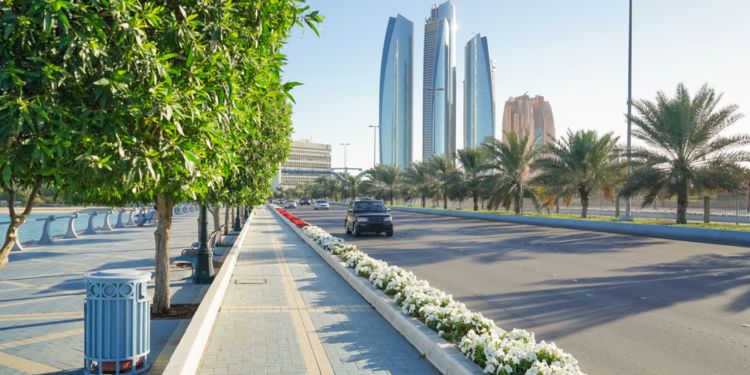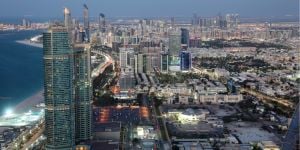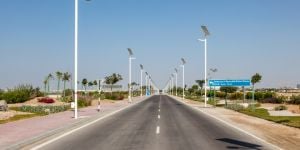
The United Arab Emirates has 9.06 million expats, and most of them spend about 30 to 50 years in the country before retiring back home. Some even consider the UAE as their second home, thus considering buying instead of renting. Here is what you need to know about buying property in Abu Dhabi as an expat.
One of the most substantial expenses for an expat in the country is accommodation, which costs about 50,000 UAE dirhams and above per year. Rent usually accounts for 40 percent of an expat's monthly income.
While expats are allowed to buy property in the UAE, most veer away from it because of high down-payment rates, job security, and uncertainty about whether they are willing to stay for the long term or not.
Benefits of investing in property in Abu Dhabi
Despite some of the factors that may cause hesitation when considering whether or not to buy property in Abu Dhabi, there are plenty of benefits that could tip the scale when making that decision.
Economically stable
Over the years, Abu Dhabi has invested in sectors outside of its main economic contributor: oil & gas. No longer dependent on just one area, the emirate's diverse economy is now contributed to by sectors like tourism and hospitality, renewable energy, and technology. With a more sustainable and stable economy, an increasing amount of people have been opting to invest in property.
No taxes
As with the rest of the country, Abu Dhabi taxes are virtually non-existent. Investing in real estate means that, as a property owner, you will not need to pay additional fees like income tax, property tax, or capital gain tax. Unlike most other places around the world, this means that any return on investment you might make from real estate will be received in its entirety, without any cuts.
Guaranteed returns and profit
The job market in Abu Dhabi has grown significantly in recent years, which has resulted in its population growth, inevitably resulting in higher demand for property. This guarantees that you will always be able to find a tenant to rent out your purchased property. More and more expats are specifically looking for high-quality options, which could leave you with a profit of 7%.
Golden Visa
As residency visas usually have a validity of 1 to 3 years, those who plan to stay in Abu Dhabi for longer might be interested in obtaining a Golden Visa. Investing in property valued at at least 2 million AED makes you an eligible candidate for the 10-year residency visa. The best part about it is that you will not be required to have a sponsor and can renew the visa as long as you continue to own your property. We've got more information regarding the Golden Visa in our detailed guide to visas in the UAE.
Safety and stability
Most expats tend to invest in property that they will eventually live in, which means the safety and stability of a place is highly important. The UAE, including Abu Dhabi, prides itself on its overall safety and low crime rates. Despite the turmoil in the rest of the region, Abu Dhabi has attracted a large number of expats due to this feeling of safety, making it an ideal environment to raise a family. Coupling this with the potential of obtaining a renewable 10-year visa, investing in property in Abu Dhabi can offer the stability most expats are looking for.
Who can buy property in Abu Dhabi?
As of 2019, expats can buy freehold property in Abu Dhabi, provided it's located in one of the “investment zones” in the emirate. These zones include:
- Yas Island;
- Saadiyat;
- Reem;
- Mariya;
- Lulu;
- Al Raha Beach;
- Sayh Al Sedairah;
- Al Reef;
- And Masdar City.
There are four main systems through which you can purchase property in Abu Dhabi:
Freehold ownership
Through this system, you can own property for 99 years, and it is renewable for the same amount of time. You will receive the property deed and have complete rights to the property, including selling, mortgaging, and leasing. However, it is important to note that you will own the property itself but not the land it is on. While this rarely occurs, it means that the landowner can choose to dispose of the property.
Strata title system
While the freehold system does not include land ownership, this system allows foreign investors to use specific land to construct for a period of 50 years, and is renewable for the same period. It still does not include actual ownership of the land, but it does mean that after a period of 10 years, property owners can manage the unit without seeking permission from the landowner.
Usufruct system
This system allows expats to fully own and utilize residential units for a period of 99 years, and is renewable for the same period. This contract entitles the owner to sell, mortgage, or lease the property as they please; however, they cannot make major changes to the property without approval.
Long-term lease system
This system is less flexible in terms of how you utilize the property. However, if you're just looking for a place to live rather than sell or lease, the long-term lease system might be right for you. It allows for a lease period of no less than 25 years and can be renewed.
The cost of properties in Abu Dhabi
The cost of a property depends on location, the developer, what type of property it is (high-, low-, or mid-end), and whether you are buying it pre-sold or when it has already been built. One must remember that the advertised rates of properties for sale usually exclude bank fees, commissions, or other governmental fees that add up to the actual cost. We've highlighted the estimated cost of property in some of the most popular freehold areas.
Yas Island
Conveniently located just a 10-minute drive away from Abu Dhabi's international airport, Yas Island is a popular choice for real estate investors. In addition to location, the area boasts a large number of entertainment options, malls, restaurants and cafes, and parks. It is home to major attractions such as the Warner Bros World and Ferrari World Abu Dhabi theme parks, making it the best place to be for people looking to be surrounded by buzzing crowds and endless activities. Rental costs are on the higher end in Yas Island, allowing you to bring in a return on investment of around 7% each year. With a mix of different property types, there's plenty to choose from, depending on how much you'd like to spend. One-bedroom apartments range from AED 560,000 to AED 3,200,000, while two-bedroom apartments cost between AED 840,000 and AED 4,390,000, and three-bedroom apartments fall under the range of AED 1,000,000 to AED 7,000,000. Two-bedroom townhouses are going for AED 1,100,000 to AED 3,800,000, and three-bedroom townhouses can be purchased from AED 2,000,000 to AED 9,000,000.
Saadiyat Island
Renters tend to flock to Saadiyat Island when looking for more luxurious areas to live in. The area features a host of cultural attractions, such as the Natural History Museum of Abu Dhabi and the Louvre Abu Dhabi. Being on the higher end of the living scale, you can enjoy returns on investment of up to 7.2% per year on properties purchased here. You'll find one-bedroom apartments on sale for between AED 890,000 to AED 8,600,000, with two-bedroom apartments costing AED 1,400,000 to AED 25,000,000, and AED 2,420,000 to AED 36,000,000 for three-bedroom apartments. If you're looking for the highest possible returns, invest in a two-bedroom townhouse for AED 7,000,000 to AED 15,000,000 or a three-bedroom townhouse for AED 2,800,000 to AED 22,000,000.
Al Reem Island
Its proximity to Downtown Abu Dhabi and accessibility of top schools and universities makes Al Reem Island a popular and attractive option for families looking for a home in Abu Dhabi. The location and amenities allow for high rental prices, securing property investors an ROI of up to 7.5% annually. One-bedroom apartments can be purchased for between AED 550,000 and AED 7,300,000, while two-bedroom apartments cost between AED 750,000 and AED 4,300,000, and three-bedroom apartments range from AED 795,000 to AED 6,450,000. It will cost you between AED 1,350,000 to AED 2,000,000 for a three-bedroom townhouse.
Al Raha Beach
Lots of expats flock to the waterfront accommodations of Al Raha Beach, featuring a mixture of both residential and retail properties. The area is fully developed and well connected to the all the other prime locations around Abu Dhabi. It is located a convenient 5-minute drive away from the airport, and is home to a wide variety of restaurants and cafes. The properties here are newly built and modern, making it an attractive option for renters and investors alike. Purchasing property in Al Raha Beach will cost you AED 680,000 to AED 1,900,000 for a one-bedroom apartment, AED 950,000 to AED 3,800,000 for a two-bedroom apartment, and AED 1,730,000 to AED 6,000,000 for a three-bedroom apartment. Duplexes are also popular in this area, with costs ranging from AED 1,150,000 to AED 6,800,000.
Al Reef
Featuring a combination of apartments and villas, Al Reef is a popular area for those looking for a more family-friendly area to live in. Although located 30 minutes away from the city centre, it is well connected to all of Abu Dhabi's major highways, making commutes easier on its residents. You'll find most of the essential day-to-day amenities are very accessible in Al Reef, creating an ideal community for families with children. Considered a more affordable area, you can purchase a one-bedroom apartment in this area for between AED 395,000 to AED 750,000, while two-bedroom apartments cost between AED 670,000 to AED 1,250,000, and AED 785,000 to AED 1,450,000 for three-bedroom apartments. Three-bedroom villas cost between AED 1,400,000 to AED 1,900,000, and four-bedroom villas are priced at AED 1,600,000 to AED 2,800,000.
How to buy a property in Abu Dhabi?
The first thing you might be wondering about is how you can find property for sale in Abu Dhabi. For those who enjoy researching the market themselves, online real estate listing websites like Property Finder, Bayut, and Dubizzle feature property listings for sale. You will be able to go through these to see what's currently available in the market. However, you will inevitably have to deal with the real estate agent who has posted the listing of your chosen property (and will have to pay their fees). Alternatively, and the recommended option, you can hire a real estate agent from the start. You can even find agents dedicated to a single area if you have a specific one in mind. They will also be able to guide you through the process, as well as advise you on which properties would make the best investment option. Some trusted real estate brokers in Abu Dhabi are Metropolitan Capital Real Estate, Better Homes, and Nationwide Middle East Properties.
Once you have decided on a property, a Memorandum of Understanding between buyer and seller is drawn up and signed. The buyer has to pay 2% of the value, which will go to the real estate agency, and another 2% to Abu Dhabi Municipality (to transfer property to you).
An ownership certificate is then issued from the developer, and an administrative fee of AED 1,000 is required to be paid to them. Compared to Dubai, it is much easier to buy in Abu Dhabi because the regulations only involve the municipality and developer.
You will also need to consider the bank property valuation fees, which range from AED 2,500 to AED 3,000.
Is it more practical to buy or rent property in Abu Dhabi?
This is a common argument among those who want to weigh their options of buying instead of renting. For those who have made up their minds to stay in Abu Dhabi for a long time, even after retirement, buying is definitely for them. At the end of 20 years, they are able to pay less for buying than renting for the long term. After they have fully paid off their mortgage, they can sell and receive their Return on Investment, which makes a good point to consider when buying. Aside from that, they can also choose to rent the property out should they decide to do it while helping to pay off their mortgage.
More and more expats are choosing to invest in properties in the UAE because, throughout the years, it has become easier for them to do so. Developers have also opened up opportunities for mid-end properties to be up for grabs, which sell at a rapid pace, especially in Dubai because it is considered a lucrative investment.
Owning a property in Abu Dhabi or any other city in the UAE comes with high financial pressure, especially when one is not sure about job security. It is essential that you have thoroughly considered this, as well as your financial status, before investing.
Useful links:
We do our best to provide accurate and up to date information. However, if you have noticed any inaccuracies in this article, please let us know in the comments section below.








